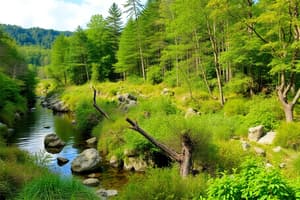Podcast
Questions and Answers
What is the primary determining factor in the location of biomes?
What is the primary determining factor in the location of biomes?
- Plant species
- Climate (correct)
- Soil composition
- Geographical features
Which layer of soil contains freshly fallen organic material?
Which layer of soil contains freshly fallen organic material?
- B horizon
- O horizon (correct)
- A horizon
- C horizon
In which latitude range do most tropical rainforests occur?
In which latitude range do most tropical rainforests occur?
- 10° - 25° (correct)
- 10° - 20°
- 20° - 30°
- 0° - 10°
What effect does latitude have on climate?
What effect does latitude have on climate?
What is an indication of the presence of mycorrhizae in soil?
What is an indication of the presence of mycorrhizae in soil?
Which soil horizon is typically rich in clay from leaching?
Which soil horizon is typically rich in clay from leaching?
What characterizes the climate of tropical rainforests?
What characterizes the climate of tropical rainforests?
Which of the following best describes the Coriolis effect?
Which of the following best describes the Coriolis effect?
Which of the following characteristics is true about tropical dry forests?
Which of the following characteristics is true about tropical dry forests?
What is a primary factor contributing to the vegetation structure in tropical savannas?
What is a primary factor contributing to the vegetation structure in tropical savannas?
Which statement about deserts is accurate?
Which statement about deserts is accurate?
What distinguishes temperate grasslands from other biomes?
What distinguishes temperate grasslands from other biomes?
Which characteristic is unique to boreal forests compared to temperate forests?
Which characteristic is unique to boreal forests compared to temperate forests?
What is a key feature of chaparral ecosystems?
What is a key feature of chaparral ecosystems?
In which latitudinal range does the tropical dry forest mostly occur?
In which latitudinal range does the tropical dry forest mostly occur?
What is a dominant feature of temperate forests, especially old-growth ones?
What is a dominant feature of temperate forests, especially old-growth ones?
Flashcards are hidden until you start studying
Study Notes
Biomes Overview
- Biomes are broad categories of ecosystems sharing common traits.
- Major examples include Desert, Rainforest, and Tundra.
- Biome identity is largely determined by plant species and climate.
Climate Influence on Biomes
- Climate is the primary factor affecting the location of biomes.
- Key climate influencers:
- Latitude affects energy input and sun angle.
- Continental Position shapes climate through land and sea interaction.
- Altitude impacts temperature due to adiabatic cooling.
- Orographic Effect changes precipitation patterns based on geography.
Soil Characteristics
- Soil is a complex mixture impacting biomes, composed of living and non-living materials.
- Influencing factors include local geology, climate, and the biotic community.
- Soil classification is based on horizons:
- O horizon: Organic material layer.
- A horizon: Mixture of minerals and organic matter.
- B horizon: Clay and leached materials containing plant roots.
- C horizon: Weathered parent material.
Tropical Rainforest
- Found within 20° latitude of the equator.
- Experiences little temperature fluctuation and receives 2,000 - 4,000 mm of rainfall annually.
- Rapid soil nutrient leaching occurs; mycorrhizae assist in nutrient acquisition.
- Heightened biodiversity with arboreal animals and diverse insect populations.
Tropical Dry Forest
- Located between 10° and 25° latitude, seasonal climate with richer soils than rainforests.
- Subject to deforestation for agriculture.
- Shares flora and fauna with tropical rainforests.
Tropical Savanna
- Positioned within 10° to 20° latitude with wet and dry seasonal alternation.
- Drought conditions lead to wildfires; soils have low water retention.
- Characterized by two-dimensional landscapes due to livestock pressures.
Desert Biome
- Predominant at 30° N and 30° S latitude, covering 20% of Earth's land.
- Water loss exceeds precipitation; soils retain low organic matter.
- Low animal abundance with high biodiversity due to adaptive behaviors.
Chaparral Biome
- Found in Mediterranean climates across all continents except Antarctica.
- Cool and moist off-seasons with hot, dry summers.
- Soil is fragile yet moderately fertile; vegetation includes fire-resistant plants.
Temperate Grassland
- Extensively distributed with annual rainfall between 300 - 1,000 mm.
- Experiences periodic droughts; soils are nutrient-rich and deep.
- Dominated by herbaceous plants; large grazing animals common, e.g., bison and cattle.
Temperate Forest (Old Growth)
- Majority located between 40° and 50° latitude with rainfall of 650 - 3,000 mm.
- Fertile soils promote long growing seasons dominated by deciduous and coniferous plants.
Boreal Forest (Taiga)
- Restricted to the Northern Hemisphere, covering 11% of Earth's land area.
- Features thin, acidic soils with low fertility and is dominated by evergreen conifers.
- Relatively high density of animal populations.
Studying That Suits You
Use AI to generate personalized quizzes and flashcards to suit your learning preferences.




